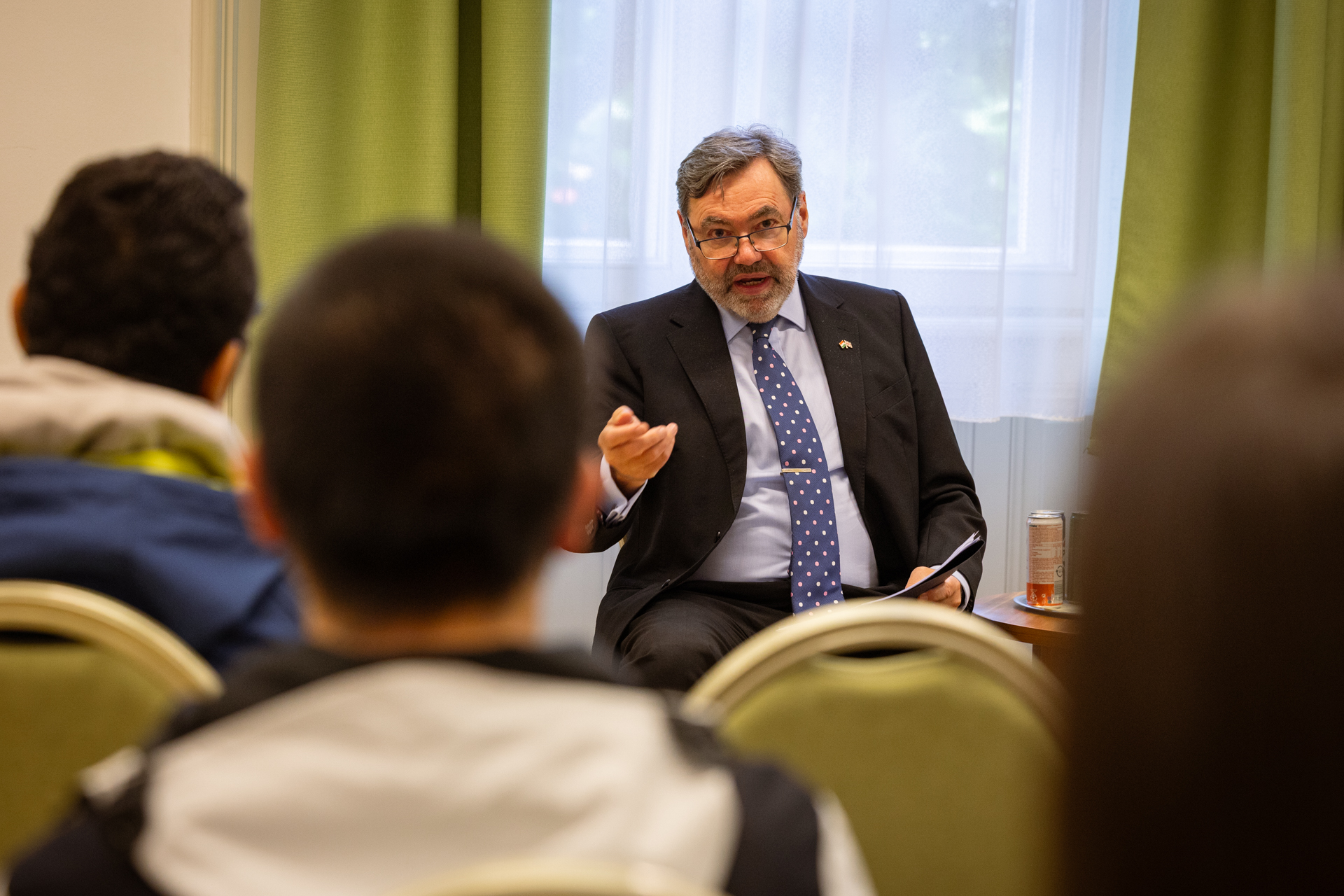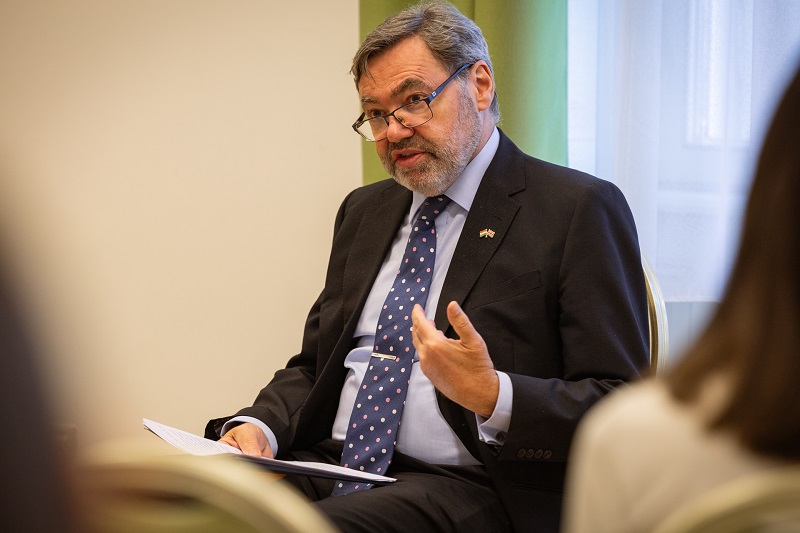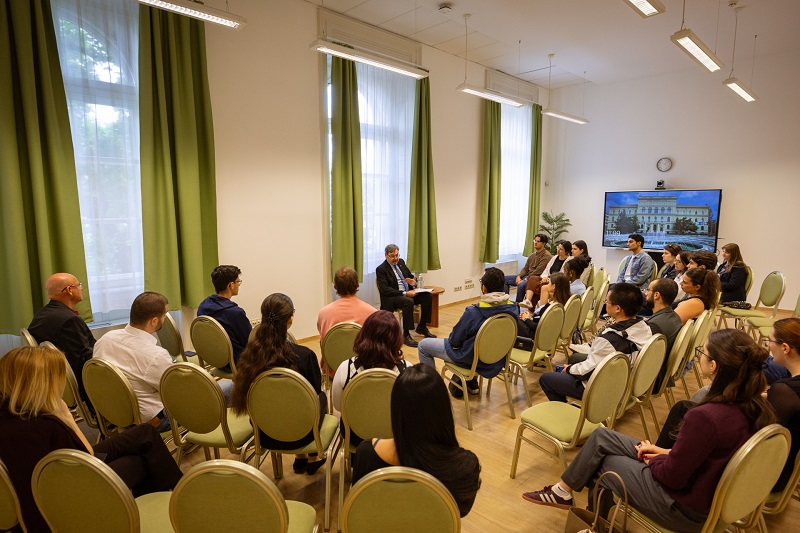
British Ambassador Paul Fox recently visited the University of Szeged to engage directly with students, sharing his unique insights from five years of diplomatic service in Hungary. Well-versed in the country’s culture and political landscape, Ambassador Fox emphasized the importance of balancing empathy for counterparts with unwavering commitment to the core values of British democracy. His candidness, thoughtful perspectives, and lighthearted humor resonated strongly with the audience.
British Ambassador Paul Fox visited the University of Szeged for an exchange with students. Setting the tone for the conversation, he began by pointing out: “Hungary and the United Kingdom are guided by shared values – democracy, the protection of collective security, and a belief in open markets.”
After outlining the state of British-Hungarian diplomatic relations, the Ambassador shifted focus to the UK’s evolving role in Europe. With a calm assurance, he then addressed the question he says students ask him most often: “When will the United Kingdom rejoin the European Union?”
“Probably not in my lifetime,” the ambassador replied. “It’s unlikely that we’ll reinstate the free movement offered by European integration or re-enter the EU customs union. But I can say this: under the new British government, there’s been a growing interest in building closer ties with EU member states and institutions. There’s a strong belief that it is in the UK’s national interest to cooperate closely with the EU and its members – to defend democracy, promote shared prosperity, and counter common security threats. That’s why we need to work together on key issues like responding to Russian aggression, combating crime and terrorism, and advancing collaboration in science and education.”
The Ambassador emphasized that he sees it as his responsibility to engage not only with the Hungarian government, but also with society at large as well as the civil sector. A key framework for this engagement is the Chain Bridge Forum, a UK–Hungary dialogue platform that was launched in Budapest in April 2023. The forum is named after Budapest’s famous Chain Bridge, designed by English engineer William Tierney Clark and built by Scottish-born engineer Adam Clark. The ambassador pointed out that the bridge was an important symbol in 19th-century Hungary and continues to represent a connection between the two nations, both literally and figuratively, with the forum aiming to bring together government officials, academics, civil society representatives, and business leaders for open, constructive dialogue on economic and security issues.
“We’re also working closely in the energy sector,” said Paul Fox. “The British company Rolls-Royce, for example, is developing small modular reactors that could provide safer, cleaner, and more affordable nuclear energy. This could help Hungary bolster its energy supply.”
As for the pressing challenges addressed at this year’s Chain Bridge Forum, the Ambassador highlighted several issues requiring joint solutions: the war in Ukraine, strengthening defense capabilities, economic difficulties, and migration management challenges.
“The United Kingdom has consistently supported Ukraine, regardless of which party is in power,” the Ambassador stressed. “So far, we’ve provided around £13 billion in military, economic, and humanitarian aid. This isn’t just about military assistance – it’s about protecting our allies, defending European security more broadly, and deterring future aggression. We’re not advocates of war. What we want is a just and lasting peace – not only for Ukraine, but for the entire Euro-Atlantic region. That will only be possible if we continue to show strength and help Ukraine defend itself.”

British Ambassador Paul Fox met with students at the University of Szeged.
Photo by Ádám Kovács-Jerney
In response to students’ questions, the Ambassador noted that the British and Hungarian positions on the war in Ukraine differ significantly. “My role,” he explained, “is to communicate our analysis, perspective, goals, and intentions to our Hungarian partners, while also trying to understand their motivations and relay that understanding back to our political leadership at home.”
A follow-up question addressed the UK’s immigration policy, prompting the Ambassador to share his views on the recent tightening of immigration rules.
“The aim of these stricter measures is to reduce net migration,” Paul Fox responded. “Following Brexit, the new system led to migration levels that were much higher than anticipated. The increase was dramatic – net migration reached 700,000, and between 2023 and 2024, it approached one million. That’s simply not sustainable. However, I don’t believe there’s an intention to end immigration altogether, because the UK still needs skilled workers. So, it’s not about stopping migration, but about controlling it.”
According to the Ambassador, the stance on migration in the UK differs significantly from the Hungarian position, and migration is not considered a politically charged topic there.
“We’re facing a different kind of challenge,” he explained. “If I understand the Hungarian situation correctly, the issue here isn’t that too many people are trying to come in. Instead, Hungary is dealing with a labor shortage – but it’s not necessarily looking to migration as the solution. In the UK, it’s quite the opposite.”
The Ambassador also stated that he does not believe the recent tightening of immigration rules will affect students already studying in the UK. “One of our goals in negotiations with the EU is to establish a youth mobility scheme,” he explained. “The British government is open to the idea. There will likely be an upper limit on participation, but the exact number hasn’t been determined yet. We’re not going back to the system that existed during EU membership, but the aim is to build in flexibility so that young people from the UK and Europe can study in each other’s countries.”
The following question addressed how much British policy toward Hungary had shifted since the change in government in London a year earlier. The Ambassador offered a measured response: “There has not been as much change as one might have expected.” He then went on to explain, “I think the main reason for that is the ongoing war in Ukraine, which remains the dominant issue. On that front, both Conservative and Labour governments in the UK have held virtually identical positions. As for areas like law enforcement cooperation and economic engagement, we’ve seen real progress during my tenure. Our trade relationship has grown by 20% and is now worth around £8 billion. At the political level, however, there are still significant differences – and the change in government hasn’t altered that much.”
Paul Fox noted that his work in Hungary goes beyond meetings with politicians and senior officials – he also regularly engages with civil society representatives and everyday citizens. This approach applies to a range of issues, including the ongoing situation in Ukraine.
“We try to explain the UK’s approach, which is centered on achieving a just and managed peace. We cannot allow Putin to gain an advantage or benefit from his actions. It’s a relatively straightforward message, and we repeat it again and again. So, yes, we do engage widely – but of course, the primary focus remains on government-level discussions. For example, in January, Hungarian Minister of Foreign Affairs and Trade Péter Szijjártó met with British Foreign Secretary David Lammy in London. Naturally, the war in Ukraine and our differing positions affected their conversation. Still, our outreach goes beyond diplomatic channels – conversations like the one we’re having right now, with you as students, are also part of how we communicate our message.”

Photo by Ádám Kovács-Jerney
Asked about how he navigates cultural and environmental differences, as well as local conflicts, Paul Fox responded:
“Well, we diplomats are adaptable. Our job is to serve anywhere, anytime. That requires flexibility, resilience, and openness. British diplomats are usually generalists, although we do tend to develop areas of expertise over time. Personally, I joined the Foreign Office as a Central and Eastern Europe specialist, with a particular focus on Russia. Geographically, most of my career has been tied to Central and Eastern Europe – I’ve served in Poland, Russia, and Azerbaijan, which is also part of the post-Soviet space. But my first overseas posting was actually to India. From there, I went to Azerbaijan, right after the Soviet Union collapsed. Then came Southeast Asia. I’ve worked in several conflict zones as well – Iraq, Afghanistan, and the Balkans. So, yes, conflict has often shaped my career. But as ambassadors, we do this because we’re interested. We’re curious. To be a successful diplomat, you need to be open-minded. You have to want to understand and learn about other cultures and languages.”
When asked what happens when a diplomat is posted to a country that isn’t democratic, Paul Fox offered a firmly pragmatic answer:
“Even in that case, I represent British interests and values. The key is that wherever we’re posted, we must represent our country – and do so with adaptability, but without compromising on core principles.”
In response to a question about the greatest culture shock in his diplomatic career, Paul Fox gave an answer characteristic of a life shaped by living across borders.
“In India, everything was a shock at first – but I adapted, and in fact, I came to enjoy it. Still, the biggest culture shock I ever experienced was actually upon returning to the UK in 1999 after nine years abroad. You know, when you’re overseas, you expect culture shock and prepare for it. What surprised me, however, was how much had changed at home.”
Among his most memorable experiences in Hungary, the Ambassador recalled a FIFA World Cup qualifier where England defeated Hungary 4–0.
“But when we lost 4–0 to Hungary in the Nations League, I enjoyed that a lot less,” he added.
Original Hungarian article by Sándor Panek
Feature Photo: British Ambassador Paul Fox met with students at the University of Szeged.
Photo by Ádám Kovács-Jerney

